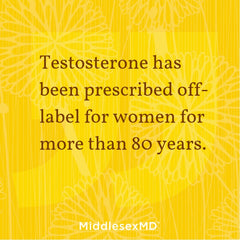Testosterone Therapy
Many women are discovering that sex after 50 can rival their experiences from decades before. Testosterone therapy has led to restored sexual function, including sexual fantasies and libido.

While not yet approved by the FDA, testosterone has been prescribed off-label for 80 years. Testosterone is one of the androgens produced in our ovaries and adrenal glands. As we age, androgen levels drop, and the drop-off occurs even more dramatically for women who have undergone a surgically induced menopause. Circulating testosterone levels probably peak for women between 25 and 30, and by age 50 we have about half of what we once had.
Some women treated with testosterone in the form of a topical patch or cream have shown improvements in overall energy, sleep habits, hot flashes, vaginal dryness, libido, and bone loss. Along with sexual thoughts or fantasies, women in testosterone therapy may be more easily aroused and more responsive to genital stimulation (which may be described as more intense orgasms). More study is needed to fully understand the benefits that testosterone therapy can offer menopausal women, and those studies are under way. They look promising! Stay tuned. The FDA appears close to approving testosterone therapy for women, and we'll report as soon as we get the word.
How To
Talk with your menopause care provider about whether testosterone therapy should be a consideration for you. Your doctor will likely test for androgen levels in your blood, and if your medical history and tests indicate that testosterone therapy is appropriate, your doctor may prescribe testosterone for you. Right now we don't have FDA-approved products for that use, but using FDA-approved male products (at a fraction of the dose used in men) or compounding a testosterone product may be an option.
Side effects of testosterone therapy are rare when the hormone is kept in normal ranges for a woman. But effects to watch out for include acne and excess body hair. Less common are voice changes and clitoromegaly (growth of the clitoris). Because few tests for long-term effects of testosterone therapy have been conducted, you should be closely monitored by your doctor.
